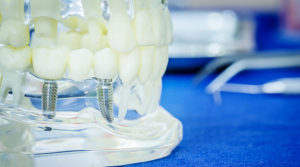 Nearly two thirds of Americans age 35 and older are missing at least one tooth due to injury, decay, cancer, gum disease, or wear over time. If you are one of the 178 million people in the U.S. missing one or more teeth, you’ve probably considered either dental implants or dentures as tooth replacement options. Both solutions can save your smile, but which option is best for YOU? In this article we’re going to help you compare and contrast some of the benefits, and limitations of each of these two viable solutions.
Nearly two thirds of Americans age 35 and older are missing at least one tooth due to injury, decay, cancer, gum disease, or wear over time. If you are one of the 178 million people in the U.S. missing one or more teeth, you’ve probably considered either dental implants or dentures as tooth replacement options. Both solutions can save your smile, but which option is best for YOU? In this article we’re going to help you compare and contrast some of the benefits, and limitations of each of these two viable solutions.
What are Dental Implants?
Patients who receive dental implants undergo a surgical procedure in which a replacement tooth root is embedded into the jawbone. Crowns, or replacement coverings, are then added to this root to complete the “new tooth.” Dental implants (with crowns) achieve the look of natural teeth and can last for over 20 years before needing to be replaced. Crowns will be custom-made for just for you, even going through pain staking lengths to ensure they perfectly match the color of your other teeth so no one will ever even be able to tell it’s not your natural tooth! So you can have confidence that your new tooth will look natural, and fit perfectly.
Who’s a Good Candidate for Dental Implants?
Dental implants are ideal for patients with strong, healthy gums. During your consultation, we can determine whether your teeth and jaw will effectively support dental implants, which are just as secure as natural teeth. Though dental implants are popular with people seeking to replace just one or two missing teeth, patients missing several teeth can often be treated with implants as well.
One reason that patients opt for implants instead of dentures is that they don’t need to be soaked and removed regularly like a set of dentures does. However, patients with implants must commit to caring for them with regular brushing and flossing, just as they would their natural teeth.
What Should I know About Dentures?
Dentures are a good alternative to dental implants for people who have weaker jaws or less healthy gums, but still want the functional, as well as cosmetic benefits associated with replacing missing teeth. Wearing dentures allows patients who’ve lost teeth to chew properly, as well as smile confidently. If a patient’s speech has been impaired by tooth loss, dentures can also help him or her to speak naturally again. Dentures can also help to fill out the face by correcting sagging, and will give you a more youthful appearance as well!
Complete dentures are an option for patients who need a full set of teeth, while partial dentures can be worn by patients who still have some of their natural teeth remaining. Both partial and complete dentures have replacement teeth which are fixed to a base that matches the gums. When partial dentures are used, the patient’s natural teeth are used to help hold the replacement teeth (the partial denture) in place. Conventional dentures are used by patients who have been missing teeth for some time and whose oral tissues are healed from any prior tooth extractions. Immediate dentures, however, can be used by a patient right away after the removal of any remaining teeth. The use of immediate dentures is a great choice for patients who want to avoid being without replacement teeth during the healing process of tooth extractions.
As with natural teeth, dentures should be brushed regularly in order to maintain their appearance and to maintain good oral health. Dentures should also be removed by the wearer while he or she sleeps at night. Patients with dentures should use a soft-bristled brush to clean their gums and palate in order to prevent plaque buildup and to encourage healthy circulation in the tissues of the mouth.
Should I Keep Scheduling Dental Exams?
At Valley Family Dental, we’ll help you navigate the various options for dental implants and dentures, so you can get your smile back with the restorative treatment that is best for your individual needs. Whether getting new dental implants, or wearing your new dentures with a smile, it is important to continue to visit us regularly. We’ll ensure that your replacement teeth are fitted properly and can make adjustments as needed during the healing process. It’s also important to keep up your regular dental exams after receiving replacement teeth so that we can continue to monitor for any signs of gum disease, oral cancer, as well as other oral health related issues.